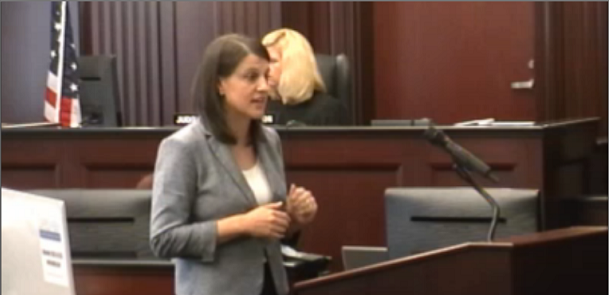
Emily Baker delivers her opening statement in Redburn v. R.J. Reynolds.
Jacksonville, FL—The origin of the cancer that killed a 52-year-old Florida man, and the disease’s potential link to his 40 years of smoking took center stage as trial began Thursday in his family’s suit against tobacco giant R.J. Reynolds. Redburn v. R.J. Reynolds, 2008-CA-000401.
Wayne Redburn allegedly began smoking at 14 and continued the habit until his 1995 cancer death. His family claims Reynolds, makers of the Kent cigarettes Redburn smoked for much of that time, conspired to hide the dangers of smoking, leading to Redburn's nicotine addiction and cancer. “What happened to Wayne Redburn and his family, and really to his entire generation was the result of a 50-year effort by these tobacco companies to... conspire to lie to the American people about what they knew about their cigarettes and what their cigarettes would do to their customers,” Terrell Hogan’s Bruce Anderson said in Thursday’s openings. Anderson noted Reynolds did not officially acknowledge the addictiveness and health risks of cigarettes until five years after Redburn died.
Anderson said Redburn suffered from a nicotine addiction so powerful it foiled several quit attempts and drove him to continue smoking even after his cancer diagnosis. “Even when he became too weak to light a cigarette, and hold it in his hand, and put it to his mouth to draw the smoke deep into his lungs, he had his wife Judy and daughter Shelby help him, by lighting the cigarette and getting the smoke to his mouth,” Anderson said.
Anderson claimed a 1994 seizure led doctors to discover terminal cancer in Anderson’s brain, but evidence would show the cancer actually originated in his lungs and was caused by smoking. “This is a classic point of origin for a brain tumor,” Anderson said. “It’s very, very common.”
The Redburn case is one of thousands of similar Florida lawsuits against the nation's tobacco companies. They stem from Engle v. Liggett Group, a 1994 class action claim involving Florida smokers. A jury in that case found tobacco companies knowingly produced dangerous, addictive cigarettes and hid those dangers from the public. The Florida Supreme Court decertified the class on appeal, but its decision allows individual plaintiffs to rely on the jury’s conclusions in the original trial if they can prove the smokers at the center of their cases suffered from nicotine addiction that caused a smoking-related disease, such as lung cancer, before November 21, 1996.
However, the defense argues there’s no evidence Redburn's cancer started in his lungs. During Thursday’s opening statements Jones Day’s Emily Baker told jurors doctors never found cancer in Redburn’s lungs, and when they discovered the terminal cancer in his brain, they pursued a course of palliative care without searching for the disease’s origin. While Baker acknowledged a nodule had been found in Redburn’s left lung a year before he died, she contended it never tested positive for cancer, and actually shrunk, without treatment. “At the end of the day there was no cancer found in Mr. Redburn’s lungs,” Baker said. “No biopsy determined that there was cancer in those lungs.”
Baker also told jurors nicotine addiction could not have caused Redburn’s death because he never truly wanted to quit smoking. Baker claimed Redburn’s family urged him to quit, but evidence would show Redburn himself never made a concerted effort to stop. Baker noted Redburn continued drinking alcohol throughout his life, which she claimed triggered smoking behavior. “He did not want to quit smoking, and even if he did, his alcohol use, not an addiction to nicotine, stood in the way between him and any serious efforts to quit,” Baker said. “The choices about drinking and smoking were his to make, and it was those decisions and those choices which were the legal cause, the only legal cause, of any disease in this case.”
Trial is expected to last through next week.
Neither the parties' attorneys nor Reynolds representatives could immediately be reached for comment.
Email Arlin Crisco at acrisco@cvn.com.
Related Information
Watch the trial live and on demand.
Not a subscriber?
Learn more about CVN's unrivaled tobacco litigation library.





